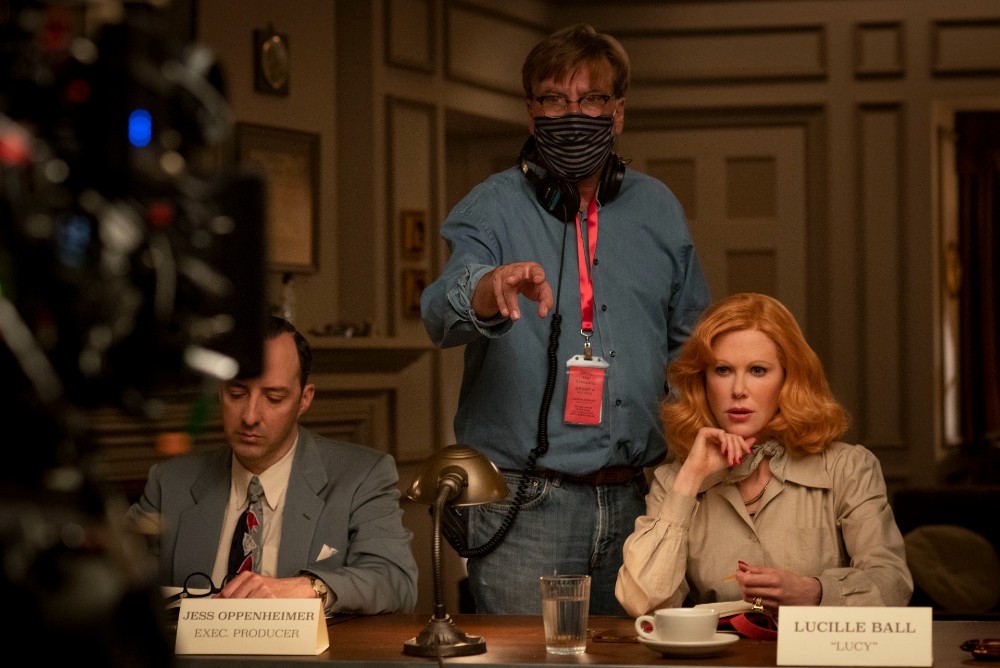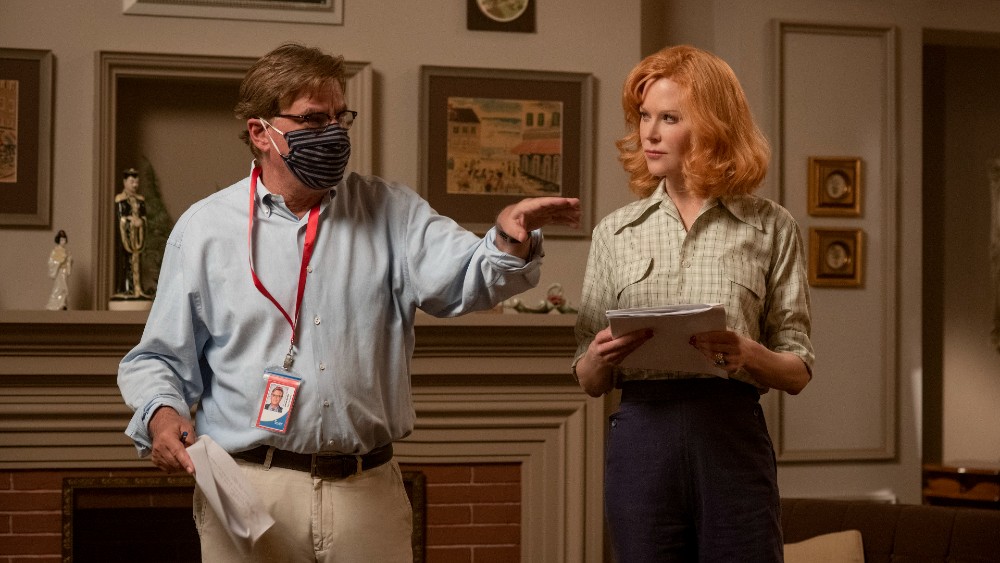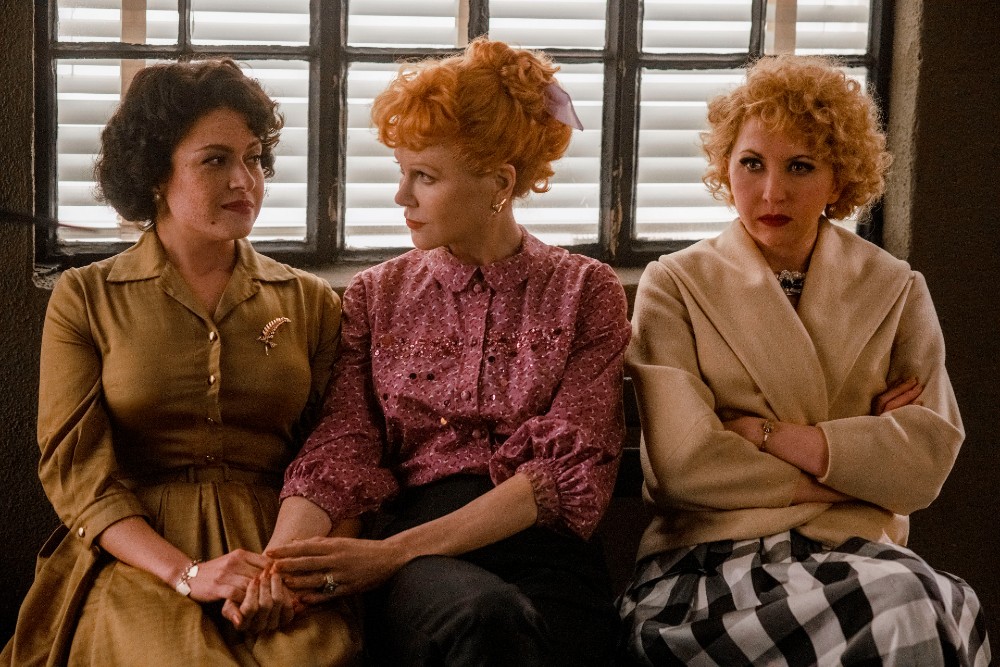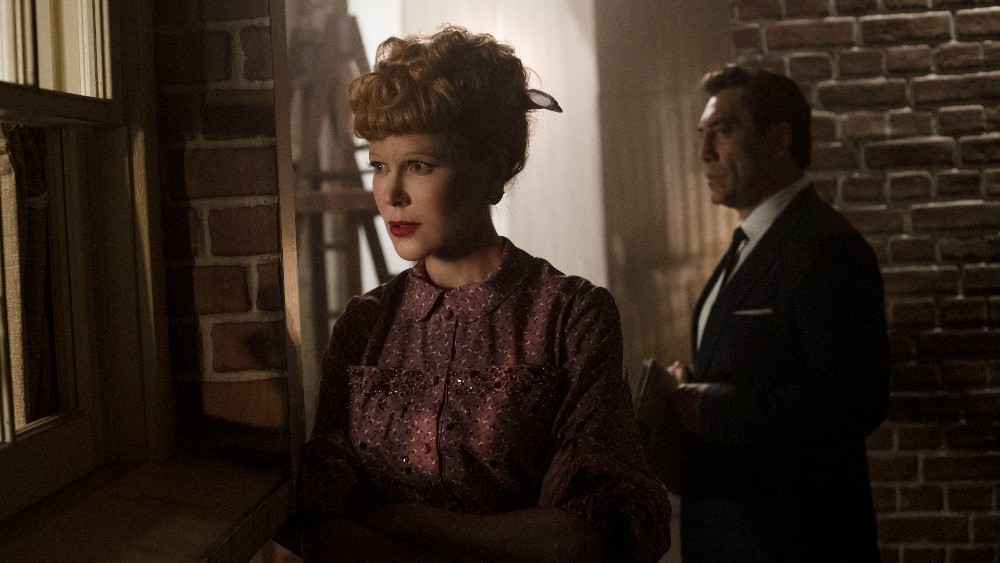
Aaron Sorkin was already one of the most renowned screenwriters in Hollywood with multiple Emmys and a single Oscar (for writing David Fincher’s The Social Network), when he decided to go behind the camera to direct one of his own scripts. That movie, 2018’s Molly’s Game, earned Sorkin another Oscar nomination, as did last year’s The Trial of the Chicago 7, both for writing, but just three years later, he’s directed his third film, Being the Ricardos.
The period drama stars Nicole Kidman and Javier Bardem as Lucille Ball and Desi Arnaz in a period during the second season of I Love Lucy where things are just starting to fall apart with questions of Desi’s fidelity, Lucy being questioned as a communist, and just general tension and conflicts on the show with their costars William Frawley (J.K. Simmons) and Vivian Vance (Nina Arianda) being upset about their roles on the show as the Ricardos’ neighbors, the Mertzes.
Sorkin has crafted another terrific screenplay that has such a fantastic cast, even beyond the four main leads, but he’s also working with a terrific team of below-the-line creatives, including a few that received Oscar nominations for Trial of the Chicago 7 (such as Editor Alan Baumgarten).
Below the Line got on the phone with Mr. Sorkin a few weeks ago to talk about the origins and sources for his script and recreating classic scenes from I Love Lucy so perfectly.
Below the Line: I’m such a big I Love Lucy fan, even though I’m not really a TV person, but I guess the most obvious question is how you got the idea to tell this story or put it together? Was it something you’d been thinking of for a while?
Aaron Sorkin: No, it wasn’t my idea. It was Todd Black, our producer. About five years ago, he asked to have a meeting with me and he asked if I’d be interested in writing a movie about Lucille Ball and Desi Arnaz. We had many meetings over the next 18 months. After 18 months, I decided, yeah. What happened in those 18 months is I learned stuff about them I didn’t know. I didn’t know that Lucy had been accused of being a communist. I learned about all the friction in their relationship, and I got the idea for a structure where the whole thing would take place during one production week of I Love Lucy — Monday table read to Friday audience taping. We would learn about both of them by putting as much pressure on them as possible during that week.

BTL: Did any of the four main actors on the show write memoirs, or was there anything out there about that time in their lives?
Sorkin: Lucy and Desi both did, and other people did too. There are any number of books written about Lucy, Desi, and I Love Lucy. I have to say that most of them aren’t very good. They were written for I Love Lucy fans, so there’s just not going to be much bad news in there. However, Desi’s autobiography, which is simply called A Book by Desi Arnaz — he is a fantastic storyteller. You can definitely feel the stiff drink that’s sitting on the desk next to his typewriter, as he writes it, and he doesn’t mind going to some darker places. So, that was very helpful.
BTL: And their kids also served as executive producers, so did you spend a lot of time talking to them about their parents? I guess they would have been very young at the time when this story takes place.
Sorkin: They were. Lucy was about a year and a half old when the film takes place, and Desi Jr. hasn’t been born yet. Lucy is pregnant with Desi Jr, but Lucy Arnaz, I think, said the most important thing to me, or at least the most important thing in terms of my committing to this. A few of us were having lunch, and it was the first time I met her, and in the middle of the lunch, she leaned over to me and said, “My mother wasn’t an easy woman. Take the gloves off.”
BTL: While you’re doing the research for 18 months or deciding on whether to do the movie, what were some of the things that jumped out at you that you wanted to explore? Obviously, the communist aspect is interesting, but was there anything that made you say, “I have to do this, and this has to be included”?
Sorkin: Yes, there were a couple of, “Oh, I’m going to put this in the movie,” things like Lucy asking Jess Oppenheimer to give Desi an EP credit to save her marriage, and Jess instead trying to convince Desi that Desi was the title character of the show. He was the “I” in I Love Lucy. But during those 18 months, and beyond, right up until today, one of the things I found most striking was the intense relationship that so many people have with Lucille Ball and I Love Lucy. Except their intense relationship isn’t with Lucille Ball. It’s with Lucy Ricardo, and it’s with Ricky Ricardo, that people have a very difficult time separating the real people from the characters that they were playing. I thought, “Well, that’s interesting, and also, I can kind of leverage that by showing the real people, that the real people were considerably more complicated than the Ricardos, and that’s a good thing for drama.”
BTL: There was a little pushback about the casting of Nicole and Javier, although once you see the movie, you realize they weren’t cast to do comedy, they were cast for the drama that’s taking place behind the scenes.
Sorkin: I don’t use Twitter as my casting director. I had a distinct advantage over the people who had a problem with Nicole’s casting, which is that I’d read the script and knew what the movie was about. Nicole wasn’t playing Lucy Ricardo. She’s playing Lucille Ball, and I am 100% confident that I cast the very best actors for each role.
BTL: I agree. You use kind of a documentary format for the film, so did you actually do interviews with some of the writers and producers, and was any of that used in the script?
Sorkin: I would have loved to, Ed, but none of them are alive anymore. The first thing I did when I had the idea for the structure, to set it during one week of production of I Love Lucy, the first thing I did was try to find someone who could tell me about a production week at I Love Lucy, and sadly, there’s simply no one alive anymore. The closest I came was when word got out that I was writing this, Ron Howard called me — to be clear, that’s unusual and I don’t think he’s ever called me. But he called me to say that when he was working on the Andy Griffith Show, on the soundstage next door, on the Desilu lot, that he liked to come to the table read on Mondays, because he liked to hear the adults curse.

BTL: William Frawley and Vivian Vance also have such great through lines with Vivian concerned about her looks and William about his age, just great characterization for both, so was that something you found while doing your research?
Sorkin: Yes, that was also something I wanted to stick in the pressure cooker of a week to dramatize. Listen, Vivian and Lucy were best friends, but Vivian, and again, you say, Vivian Vance, people are going to picture Ethel Mertz, when in fact, Vivian was a beautiful, glamorous, sexy stage ingénue, and Lucy needed her to be the frumpy landlady from downstairs. Plus, as she says in the film, Lucy is married to a very handsome man who is younger than Lucy is… and Ethel Mertz is married to her grandfather. So there was friction there, as well as friction between Lucy and Madelyn Pugh. Madelyn Pugh, Bob Carroll, and Jess Oppenheimer wrote every episode of I Love Lucy as well as every episode of My Favorite Husband, the precursor to I Love Lucy. Madelyn started to bristle a little bit at the number of episodes they were doing, where Lucy has to figure out a way to work around Ricky’s permission.
BTL: When I first watched the show as a kid, I just assumed Vivian and William were very close in age, when in fact there was a 20-year gap between them. Since this is for Below the Line, I do want to talk about some of the amazing crew and craftspeople you worked with. Your production designer, Jon Hutman is a veteran, who originally designed the pilot of The West Wing, so that’s quite a callback.
Sorkin: He did The West Wing, and he did a beautiful job, but the reason I wanted him on Being the Ricardos so much was Quiz Show. I love the look of Quiz Show, and I just thought if he could transport that to Hollywood, and do a Hollywood version of that, that was exactly what I was looking for. And he did that and more. John Hutman, [DP] Jeff Cronenweth, [Costume Designer] Susan Lyall, [Editor] Alan Baumgarten, and [Composer] Daniel Pemberton, I consider them coauthors of the film.
BTL: I mentioned them all in my review.
Sorkin: Oh, good.
BTL: One thing I really loved about the movie was that you recreated some of the classic scenes from I Love Lucy to the point where I wasn’t sure if you were just using clip from the show, because it was close enough I could not tell.
Sorkin: That’s music to my ears First of all, it was important that those shards of I Love Lucy have a reason to be there, that they not feel like we’re a cover band just doing I Love Lucy’s Greatest Hits. The reason to be there is that when we’re doing those, as I said, shards of I Love Lucy, we go until Lucy’s head, and we see that she is a comedic chessmaster, who at a table read is able to see a line and how it’s gonna play in front of an audience on Friday, and she can press on it. “Yeah, the grapes are a great idea, but is there enough for me to do there, or am I just going to be standing in a vat of grapes looking at the audience?” So like I said, the key was making sure that the audience understood why we’re seeing this right now, that we’ve gone into Lucy’s head, and that was about camera movement and editing.

BTL: Were there any color pictures from on-set or behind the scenes from the time for Jon and makeup, costumes, etc to work from? Or was it just going from the black and white show, as it aired?
Sorkin: There’s color material, and Jon and his team, they leave no stone unturned. They track down every piece of everything to use as reference for, ultimately, what they want to have on the set. There was a really terrific coordination between Jon and Jeff. Jeff does a lot of things extremely well, but one of the things he likes to do is blow-out windows with light, which I liked for this. So, that’s why Jon, in so many of the rooms, puts big windows there, so that Jeff could have the sun go supernova outside, and it creates a beautiful silhouette of the actor who can then turn and suddenly, they’ll be washed in light. It creates an atmosphere in the room.
BTL: What were some of the challenges or changes that had to be made to make this movie fully under COVID? Was it hard to do your normal thing and work with actors with all the protocols that were to be followed?
Sorkin: Our line producer, Stuart Besser, and a group of really terrific health care professionals managed to make it so that it went remarkably smoothly. We didn’t have one positive test. We never ran over on the day, because we were constantly tripping over COVID protocols. I think it did create… I think it was good for morale. I think that we all felt like we were doing this difficult thing under difficult circumstances and succeeding at it, and everybody worked together. It was a lot of esprit de corps.
BTL: Is anything that you did differently that you might want to consider doing post-pandemic, whenever that is?
Sorkin: I can’t think of anything. Honest to God, my biggest problem was my glasses fogging up from the mask. Now that’s not to say that other people didn’t have big problems with it, just because it was fairly comfortable for me that it was fairly comfortable for everybody. I’m sure it wasn’t, but they’re not complainers.
BTL: I think that’s our time, but I do want to give a shoutout to Daniel Pemberton, because I loved this score, and I thought he was robbed for the Oscar last year with the song he co-wrote for Trial of the Chicago 7.
Sorkin: I thought so, too. His score for this is beautiful. I asked him to write a lush orchestral score with a theme that sounded like almost triumph, but ultimately heartbreak. Somehow, he translated those words into musical notes, and I think his score is magnificent, and I hope a lot of people think so, too. I’m glad you did.
Being the Ricardos is now streaming on Amazon Prime Video. Look for more interviews with Sorkin’s talented heads of department in the coming weeks.





